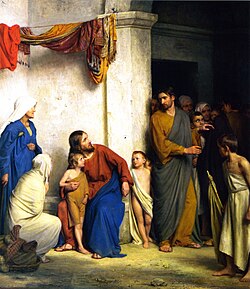Least Ye Become Like Small Child Again

Jesus' teachings referring to little children (παιδίον, paidíon) and infants/babies appear in several places in the New Testament and in the non-canonical Gospel of Thomas.
New Testament [edit]
The King James Version of Matthew'southward gospel (chapter 18) relates that:
At the aforementioned time came the disciples unto Jesus, saying, Who is the greatest in the kingdom of heaven?
And Jesus called a footling child unto him, and gear up him in the midst of them,
And said, Verily I say unto you, Except ye be converted, and become
equally piffling children, ye shall not enter into the kingdom of sky.
Whosoever therefore shall humble himself as this fiddling child, the same is greatest in the kingdom of heaven.
And whoso shall receive 1 such little child in my name receiveth me.
But whoso shall offend one of these little ones which believe in me, it were better for him that a millstone were hanged about his neck, and that he were drowned in the depth of the ocean.
Woe unto the world because of offences! for it must needs be that offences come; but woe to that human by whom the offence cometh!
Wherefore if thy manus or thy foot offend thee, cut them off, and cast them from thee: it is better for thee to enter into life halt or maimed, rather than having two hands or two feet to exist cast into everlasting burn down.
And if thine center offend thee, pluck it out, and cast information technology from thee: it is better for thee to enter into life with one middle, rather than having two optics to be cast into hell fire.
Take heed that ye despise not one of these little ones; for I say unto you, That in heaven their angels practice always behold the face of my Father which is in heaven. (Matthew 18:1–10)
The word translated as converted in the King James Version [ane] (Greek: στραφητε, straphēte) literally means 'turn'. Information technology is translated as "turn" in the English and American Standard Versions and as "change" in the New International Version. Elsewhere in the New Testament, the change of centre demanded past John the Baptist and past Jesus often uses the give-and-take metanoia (Greek: μετάνοια).[2] German theologian Heinrich Meyer suggests that Jesus' challenge to his disciples is to "plough round upon [the] road, and to larn a moral disposition similar to the nature of little children".[iii]
The Kingdom of Sky is compared to little children at several other places in the New Testament:
- Matthew 19:13–xv
Then were there brought unto him little children, that he should put his hands on them, and pray: and the disciples rebuked them.
Just Jesus said, Suffer little children, and prevent them not, to come unto me: for of such is the kingdom of heaven.
And he laid his easily on them, and departed thence. - Luke 18:15–17
And they brought unto him also infants, that he would touch them: simply when his disciples saw it, they rebuked them.
But Jesus called them unto him, and said, Suffer little children to come unto me, and forbid them not: for of such is the kingdom of God.
Verily I say unto you, Whosoever shall not receive the kingdom of God as a niggling child shall in no wise enter therein.
Gospel of Thomas [edit]
Another proverb referring to modest children can be found in the non-canonical Gospel of Thomas. The two passages (Matthew 18:1-6 and the passage in Thomas) are dissimilar in tone. Nevertheless, both start past comparing those who enter the Kingdom of Sky to children, and so make references to eyes, hands, and feet. In Matthew, Jesus suggests that these offending parts should be "cut off," whereas the passage in Thomas takes a different tone in describing spiritual cleansing and renewal:
From the Gospel of Thomas:
22. Jesus saw some babies nursing. He said to his disciples, "These nursing babies are like those who enter the (Father'southward) kingdom". They said to him, "And so shall we enter the (Father'due south) kingdom equally babies?" Jesus said to them, "When you make the two into one, and when you make the inner similar the outer and the outer similar the inner, and the upper like the lower, and when you make male person and female into a unmarried one, so that the male volition non exist male person nor the female be female, when you make eyes in place of an eye, a hand in place of a hand, a human foot in place of a pes, an paradigm in place of an image, then yous will enter [the kingdom]."[4]
See also [edit]
- Kingdom of heaven (Gospel of Matthew)
- Matthew 19
- Luke 18
Further reading [edit]
- Friedrich Justus Knecht (1910). . A Applied Commentary on Holy Scripture. B. Herder.
References [edit]
- ^ Matthew 18:3 KJV
- ^ Matthew 3:1 WHNU
- ^ Heinrich Meyer's NT Commentary on Matthew 18, accessed 31 January 2017
- ^ The Gospel of Thomas, translated by Stephen Patterson and Marvin Meyer: choice from Robert J. Miller, ed., The Complete Gospels: Annotated Scholars Version, Polebridge Press, 1992, 1994, accessed 6 February 2017
picotradepery1950.blogspot.com
Source: https://en.wikipedia.org/wiki/Teaching_of_Jesus_about_little_children